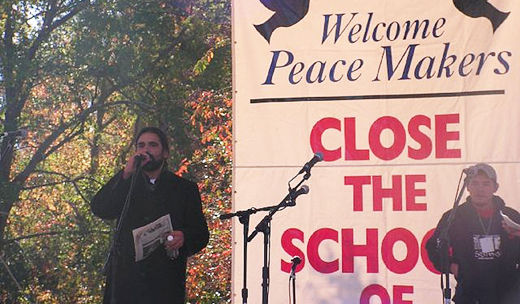
As resistance to U.S. militarization in Latin America and the Caribbean mounts, nine activists with the School of the Americas Watch (SOA Watch) on August 3 began demonstrations, projected to last one week, at the Tolemaida military base in Colombia. Their twelve foot banner proclaimed “U.S. Military out of Colombia.”
SOA Watch was protesting the U.S.- Colombian agreement last year granting U.S. military use of that base and six others for ten years. SOA Watch founder Father Roy Bourgeois was on hand, along with activists previously jailed for civil disobedience at Ft. Benning, Georgia aimed at closing the School of the Americas, located there. The designation now is Western Hemisphere Institute for Security Cooperation (WHINSEC).
The next day, the Colombian groups Justice and Peace, the Movement of Victims of State Crimes, Mothers of Soacha (whose children were killed by the Colombian military), and SINALTRAINAL trade union joined the protesters. “Our delegation has been deeply moved by the strength and spirit of so many Colombians struggling for a just peace in Colombia,” Roy Bourgeois told reporters. Together they were speaking “with one voice, against U.S. domination and militarization.”
The U. S. activists’ press statement said: “We recognize the unjust, deadly role our government has played throughout Latin America for decades.” Lease of Colombian bases to the United States “threatens Colombian sovereignty, militarizes the region, and poses a threat to neighboring countries.” And “Colombia’s vast resources should benefit Colombians first – all Colombians – rather than multinational corporations.”
According to the statement, “More than 65,000 Latin American soldiers have learned repressive counterinsurgency techniques [at SOA/WHINSEC, and] more than 12,000 Colombian graduates have brought those lessons home – with deadly, anti-democratic results.”
Latin American opponents to U.S. bases in Colombia condemn U.S. strategic objectives displayed in military documents used in preparing the bases agreement. They include “full spectrum operations throughout South America” and targeting of “anti-U.S. governments” along with drug traffickers and guerrilla insurgents.
The Tolemaida protest represents a new orientation for SOA Watch. It now is taking on U.S. militarization in the region in addition to its historic project of closing down the SOA/WHINSEC. SOA Watch staged a weeklong planning session in Lara state, Venezuela in June to set plans and priorities. The present writer attended.
A summary of deliberations there called for “actions in our countries in support of the resistance in Honduras,” yearly vigils continuing outside Ft. Benning, and simultaneous vigils outside U.S. military bases in Colombia and Honduras and “in front of U.S. embassies in our countries.” Activists from Colombia, Honduras, Mexico, and Haiti will take part in vigils at Ft. Benning. SOA Watch plans an anti-militarization vigil in Haiti on January 11, 2011.
The meeting called also for SOA Watch joining “the Colombian resistance” in actions against foreign bases there. The protest at Tolemaida was the first of these. On August 23, SOA Watch activists will march outside the U.S. base at Palanquero with delegates at a Women and People’s Summit of the Americas against Militarization in Colombia.
SOA Watch prioritized the recently launched Continental Campaign against Foreign Military Bases. Representatives will be present at the Social Forum of the Americas in Paraguay August 11 – 15 to lend support for that initiative. SOA Watch has joined the Continental Campaign’s U.S. Working group.
The Fellowship of Reconciliation (FOR) report “Military Assistance and Human Rights,” released in July, documents human rights wastage stemming from U.S. military aid to Colombia. Participants in the SOA Watch strategizing meeting see that report as a call to action, if post-meeting communications are any indication.
FOR asserted that, “Many Colombian military units committed 56 percent more extrajudicial killings during and after the highest levels of U.S. assistance to those units.” When U.S. support for Colombian military units was reduced, however, “the number of executions reportedly committed by units operating in the jurisdiction fell,” also by an average of 56 percent. Couched in measured terms, the report cites the “Leahy Amendment, which prohibits assistance to any foreign security force unit if the State Department has credible evidence that the unit has committed gross human rights violation.” Implementation of the Leahy Law requires, according to FOR, big cuts in U.S. military aid to Colombia. To review the report go here.
Photo: http://www.flickr.com/photos/upturnedface/306738030/sizes/z/









Comments